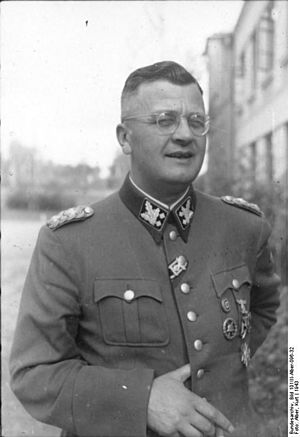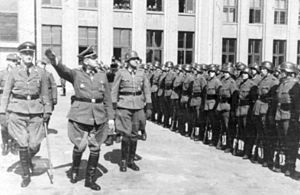Erich von dem Bach facts for kids
Quick facts for kids
Erich von dem Bach-Zelewski
|
|
|---|---|

SS Obergruppenfuhrer Erich von dem Bach-Zelewski
|
|
| Allegiance | |
| Service/ |
|
| Years of service | 1931–1945 |
| Rank | Obergruppenführer |
| Unit | Waffen-SS |
| Commands held | SS and Police Leader for Silesia |
| Battles/wars | Warsaw Uprising |
| Awards | Iron Cross, German Cross, Knight's Cross of the Iron Cross |
Erich von dem Bach-Zelewski (born March 1, 1899 – died March 8, 1972) was a high-ranking leader in Nazi Germany. He was a member of the SS, which was a powerful group under Adolf Hitler. His rank was SS-Obergruppenführer.
Erich von dem Bach-Zelewski was involved in the killing of many people in Poland and Russia during World War II. However, he was never officially charged with war crimes for these actions.
Contents
Erich von dem Bach-Zelewski's Life
His Early Years
Erich Julius Eberhard von Zelewski was born on March 1, 1899, in Lauenburg, which was then part of the German Empire. This area is now called Lębork, in Poland. His family did not have much money when he was a child. His father, Otto Jan Józefat von Zelewski, was often without work.
Erich later changed his last name to "von dem Bach-Zelewski" in the 1930s. His family had faced some difficulties because his uncle, Emil von Zalewski, was killed in a battle in Tanzania. Erich wanted to bring honor back to his family's name.
Becoming a Soldier
After his father died, Erich's uncle, Oskar von Zalewski, who was a soldier, encouraged Erich to join the army. In November 1914, Erich von Zelewski joined the Prussian army. He was one of the youngest soldiers fighting in World War I. He was hurt twice during the war and received medals like the Cross of Honor and the Iron Cross.
After World War I ended, he stayed in the army. He fought in the Silesian Uprisings, where he became known for being brave. He received more medals for his actions. In 1924, he joined the Grenzschutz, which were border guards. A year later, in October 1925, he officially changed his last name to von dem Bach-Zelewski.
Joining the Nazi Party
Erich von dem Bach-Zelewski left the border guards in 1930. He then joined the Nazi Party, which was led by Adolf Hitler. In 1931, he became a member of the SS, a powerful Nazi organization. He quickly moved up in rank. By the end of 1933, he was an SS-Brigadeführer.
He was a member of the Reichstag, which was like the German parliament, from 1932 to 1944. In 1934, he took part in an event called the Night of the Long Knives. During this time, he was involved in the death of Anton von Hohberg und Buchwald, an SS officer he had argued with.
He held many important jobs within the Nazi Party. He worked in East Prussia and later in Silesia. By 1937, he became the Höherer SS- und Polizeiführer (Higher SS and Police Leader) in Silesia.
His Role in World War II
When World War II began in 1939, units under von dem Bach-Zelewski's command were involved in terrible actions, including the shooting of prisoners, during the September Campaign.
In November 1939, Heinrich Himmler, the head of the SS, gave him a new job. He was to be the "Commissioner for the Strengthening of Germandom" in Silesia. His task was to force non-German people to leave their homes and take their property. By August 1940, his units had forced over 20,000 families from the town of Żywiec to leave.
Later in 1939, he suggested creating a concentration camp for non-German people. Himmler agreed, and in May 1940, the Auschwitz concentration camp was opened.
Rising Through the Ranks
On June 22, 1941, von dem Bach-Zelewski became a Higher SS and Police Leader in the "Army Group Center." In July 1943, he became the commander of "Band-fighting Units." These units were responsible for the killing of many people, including 35,000 in Riga and over 200,000 in Belarus and eastern Poland.
He was supposed to become the Higher SS and Police Leader in Moscow, but the German army did not capture the city. Until 1943, he was in charge of "anti-partisan" units on the central front. This was a special command given to him by Adolf Hitler.
In February 1942, he was hospitalized due to health problems. He later claimed it was because of the terrible actions he was involved in, like the mass killings in Belarus. However, British intelligence reports suggested his illness was physical. He returned to his job in July, and his actions did not change.
Fighting on the Front Line
In 1944, von dem Bach-Zelewski took part in fighting on the front lines in the Kovel area. But in March, he had to go back to Germany for medical treatment. Heinrich Himmler then took over all his duties.
On August 2, 1944, he took command of all soldiers fighting against the Warsaw Uprising in Poland. His units were responsible for the deaths of about 200,000 people. After more than two months of intense fighting, the city of Warsaw was almost completely destroyed. He was then able to control the city. For his actions in Warsaw, the Nazi Government gave him the Knight's Cross of the Iron Cross on September 30, 1944.
Awards He Received
- Iron Cross (World War I)
- German Cross (February 23, 1942)
- Knight's Cross of the Iron Cross (September 30, 1944)
After World War II
After the war, von dem Bach-Zelewski tried to hide and leave the country. However, US military police arrested him on August 1, 1945. He shared information with the Allies about his former Nazi leaders during the Nuremberg Trials. Because of this, he was never put on trial for any war crimes committed during the war. He also did not have to go back to Poland or the USSR to face charges. He was released from prison in 1949.
In 1951, von dem Bach-Zelewski was sentenced to ten years in prison for murders he committed in the early 1930s. He did not go to prison until 1958. At that time, he was found guilty of killing Anton von Hohberg und Buchwald during the Night of the Long Knives and was sentenced to four and a half years. In 1961, he received another ten-year sentence for killing ten German Communists in the early 1930s.
Erich von dem Bach-Zelewski died in a prison in Munich on March 8, 1972. He was never imprisoned for the terrible crimes he committed during World War II, even though he openly admitted to being involved in the killing of Jewish people.
It is said that Adolf Hitler thought highly of von dem Bach-Zelewski, calling him "so clever he can do anything, get around anything."
Images for kids
See also
See also
 In Spanish: Erich von dem Bach-Zelewski para niños
In Spanish: Erich von dem Bach-Zelewski para niños
 | Janet Taylor Pickett |
 | Synthia Saint James |
 | Howardena Pindell |
 | Faith Ringgold |




